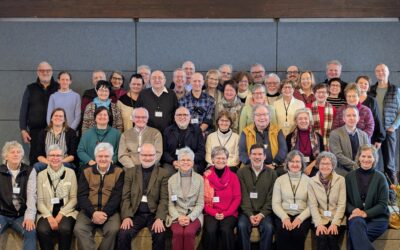 What is happening to the Church today? How are the challenges of passing on the faith to new generations to be tackled, given the scandals that have arisen in several countries and the abandonment of the faith in Europe? How are the vitality and gifts emerging from the lands of Asia and Africa to be appreciated and welcomed?
What is happening to the Church today? How are the challenges of passing on the faith to new generations to be tackled, given the scandals that have arisen in several countries and the abandonment of the faith in Europe? How are the vitality and gifts emerging from the lands of Asia and Africa to be appreciated and welcomed?
These are some of the underlying questions that were discussed by the group of experts from the fields of ecclesiology and communications, composed of priests, religious and laity who are active in various environments in different parts of the world (in missiology, ecclesiology, education, new evangelization, youth culture). They gathered together in the middle of June at Castelgandolfo, Italy to identify the challenges both at a universal level and at a local geographical level where they take on different forms in different contexts but, when taken together, can help give a vision of what is being faced by the Church.
The voice of the sociologists cited issues at the macro and micro level which not only the Church but the entire society must take into account: the management of the complexity in the global scene, the new framework for relationships and the creation of social cohesion. The Pentecost 2013 event was given a second look and was seen as a call for the Movements to become involved as the Pope invited them to “go out” and meet the human person where he or she is to be found.
 The event promoted by the Gens magazine on ecclesial life was held this third time on June 12-13. Focolare president, Maria Voce offered some opening remarks. She underscored how the “push given by the new Pope to be closer to all people, more sober, more simple,” for the Focolare Movement “should signify a renewed commitment to building up and showing the Church-communion which the charism of unity allows us to live; communion with God and with all humanity: continually going out of ourselves as Pope Francis invited us to, and which we also particularly feel we should do. We must be the Church-communion and present ourselves as such, even outside strictly ecclesial structures.”
The event promoted by the Gens magazine on ecclesial life was held this third time on June 12-13. Focolare president, Maria Voce offered some opening remarks. She underscored how the “push given by the new Pope to be closer to all people, more sober, more simple,” for the Focolare Movement “should signify a renewed commitment to building up and showing the Church-communion which the charism of unity allows us to live; communion with God and with all humanity: continually going out of ourselves as Pope Francis invited us to, and which we also particularly feel we should do. We must be the Church-communion and present ourselves as such, even outside strictly ecclesial structures.”
Co-president Giancarlo Faletti recalled the “passion for the Church” that had always animated Chiara Lubich especially in the period just after the Second Vatican Council. He invited everyone to continue to recognize the action of the Holy Spirit who continues to guide the People of God.
The challenge of the new generations and education strongly emerged. One example was the recent Plenary Session of the Pontifical Council of Culture on emerging youth cultures, from which the elements that have matured through the active participation of young people, from the language of the younger generations to knowing and understanding the world of the youth for the transmission of the Catholic faith.
 “Five words for my Church” was the suggestive title given to a presentation via Skype, by theologian Piero Coda from Sophia University Institute which he heads in the Focolare town of Loppiano, Italy. These five words or concepts “following, People of God, dialogue, spirit and ethos” were presented by him as the lines along which today’s Church will develop.
“Five words for my Church” was the suggestive title given to a presentation via Skype, by theologian Piero Coda from Sophia University Institute which he heads in the Focolare town of Loppiano, Italy. These five words or concepts “following, People of God, dialogue, spirit and ethos” were presented by him as the lines along which today’s Church will develop.
“In fact, the Holy Spirit is quite capable of generating new energies for responding to the most pressing questions of humankind (. . .) It is the Holy Spirit who brings the Church forward, and at times He does it with rather brusque changes. And we who are not always so pliable have the impression of having to remake everything from scratch. But we should rather look to this road that the Holy Spirit opens in the Church.”




0 Comments